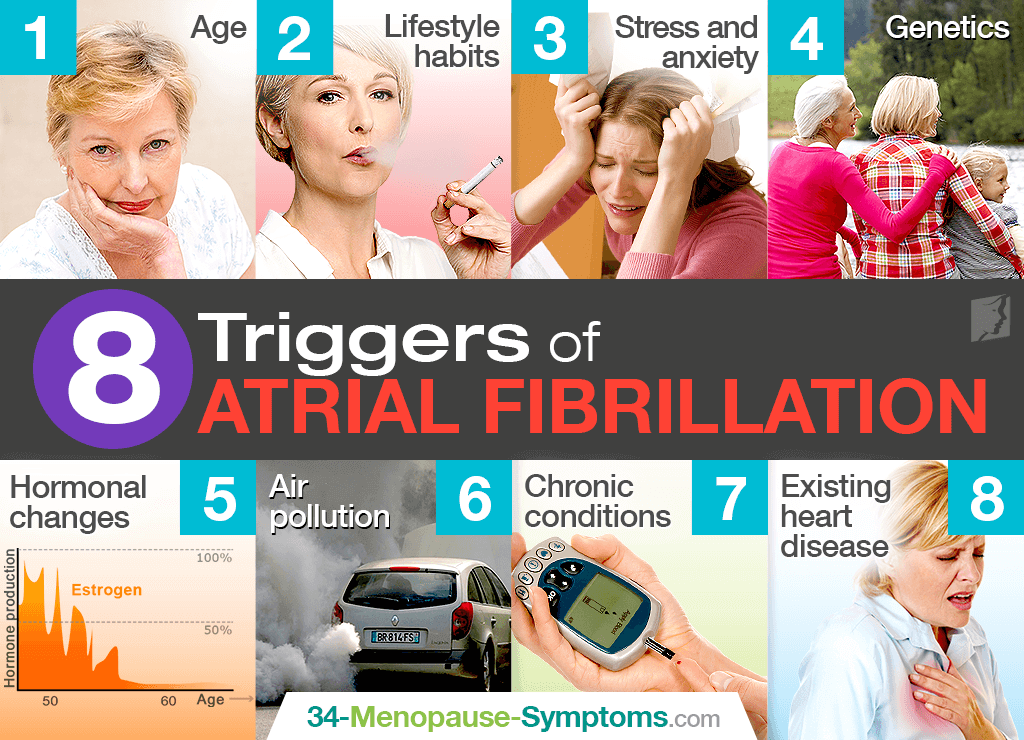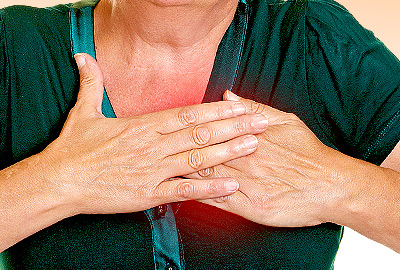Atrial fibrillation, commonly shortened to AFib or AF, is the most common type of cardiac arrhythmia, occurring in middle-aged women. While the term arrhythmia signifies any deviations from the normal heart rate, such slow, fast, or irregular pulse, atrial fibrillation is characterized by a rapid, disorganized heartbeat. It occurs when there is a sudden disruption in the electrical system of the heart. Continue reading to learn about the triggers of atrial fibrillation worth paying attention to.
Age
Though atrial fibrillation occasionally occurs among young people, its prevalence significantly increases with age. It is estimated that after age of 75, 60% of all AF cases occur in women.
Lifestyle Habits
Unhealthy habits, such as smoking cigarettes, obesity, alcohol, illegal drugs, and caffeine may increase the incidence of atrial fibrillation, especially over age of 35.
Stress and Anxiety
As in most heart-related conditions, prolonged stress and anxiety can have detrimental consequences on heart's health and might contribute to the development of atrial fibrillation.
Genetics
Although this claim has not been validated by science, there is evidence that atrial fibrillation runs in families and having family history of AF might predispose women to it.
Hormonal Changes
Some studies have reported a link between early menopause and estrogen level fluctuations and developing atrial fibrillation, but they are not conclusive.
Air Pollution
It has been observed that the pollutants from cars and power plants, such as carbon monoxide or nitric dioxide, can trigger episodes of atrial fibrillation.
Chronic Conditions
Certain chronic conditions, such hypertension, diabetes, asthma, or hyperthyroidism, put women at higher risk of developing atrial fibrillation. There is also a correlation between sleep apnea and AF, though not fully understood yet.
Existing Heart Disease
AFib is prevalent among women suffering from coronary heart disease, valve disease, and inflammation of the heart muscle or its lining. History of a heart attack, congestive heart failure, or recent heart surgery also present a risk.
Symptoms of Atrial Fibrillation
Though symptoms of AF are not always present, they typically include rapid and irregular heartbeat, fatigue, dizziness, weakness, confusion, and sweating.
Atrial Fibrillation: Should I Be Worried?
Also, it is important to understand that an asymptomatic atrial fibrillation still presents danger to the heart and can lead to more serious medical conditions. Blood clot formation, common in atrial fibrillation, makes this condition life-threating. Such clot can travel from atria to the brain and cause a stroke. Other complications include heart failure, resulted from an insufficient blood supply from the heart to the rest of the body.
Atrial fibrillation is a serious and debilitating disease. Its episodes often interfere with women's daily activities, leaving them exhausted and incapacitated. However, since it is the most common of all cardiac arrhythmias, there is a substantial ongoing research and countless resources that can help you learn the common triggers to better manage atrial fibrillation. Click if you are curious to learn how stress affects your heart health during menopause.
Sources
- American Heart Association. (2017). What is Atrial Fibrillation (AFib or AF)? Retrieved August 8, 2017 from http://www.heart.org/HEARTORG/Conditions/Arrhythmia/AboutArrhythmia/What-is-Atrial-Fibrillation-AFib-or-AF_UCM_423748_Article.jsp
- Ganjehei, L. (2011). Cardiac Arrhythmias in Women. Retrieved August 8, 2017 from https://www.ncbi.nlm.nih.gov/pmc/articles/PMC3066817/
- MedlinePlus. (2016). Atrial fibrillation. Retrieved August 8, 2017 from https://medlineplus.gov/atrialfibrillation.html
- National Institutes of Health. (2014). What is Atrial Fibrillation? Retrieved August 8, 2017 from https://www.nhlbi.nih.gov/health/health-topics/topics/af
- National Institutes of Health. (2013). Acute Exposure to Air Pollution Triggers Atrial Fribrillation. Retrieved August 8, 2017 from https://www.ncbi.nlm.nih.gov/pmc/articles/PMC3752319/
- National Institutes of Health. (2011). Smoking and Incidence of Atrial Firbillation. Retrieved August 8, 2017 from https://www.ncbi.nlm.nih.gov/pmc/articles/PMC3139831/
- National Institutes of Health. (2014). What is Atrial Fibrillation? Retrieved August 8, 2017 from https://www.nhlbi.nih.gov/health/health-topics/topics/af



